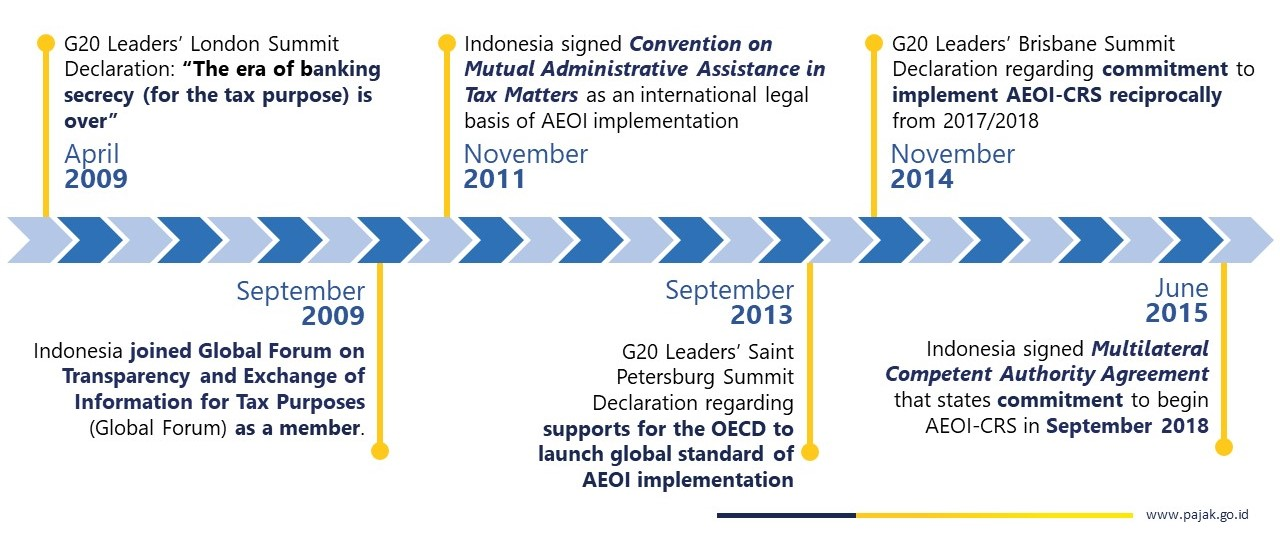
The Common Reporting Standard (CRS), developed in response to the G20 request and approved by the OECD Council on 15 July 2014, calls on jurisdictions to obtain information from their financial institutions and automatically exchange that information with other jurisdictions on an annual basis. It sets out the financial account information to be exchanged, the financial institutions required to report, the different types of accounts and taxpayers covered, as well as common due diligence procedures to be followed by financial institutions.
A Brief History of AEOI
Early Days
1997
For many years, the OECD has taken a leading role in developing policy and technical solutions for the exchange of information. For more than a decade, countries have been relying on the OECD Standard Magnetic Format (SMF) for exchanging tax information.
2003
Since the adoption of the EU Savings Directive in 2003 as the first multinational automatic exchange of information programme, a lot of progress has been made in terms of increasing international co-operation in tax matters and global tax transparency.
2010
With the adoption of the Foreign Account Tax Compliance Act (FATCA) by the United States Congress in 2010 and against the background of the global financial crisis, a significant political momentum for putting in place a global automatic exchange standard developed.
2012
In 2012 the five major European countries (the United Kingdom, France, Spain, Italy and Germany) agreed with the United States on a reciprocal exchange of FATCA information under Intergovernmental Agreements (IGAs) concluded between the United States and each of the five countries. In the same year the OECD presented a report on the automatic exchange of tax information, highlighting a broad range of existing programmes and recommending future action. The report was endorsed by the G20 at their Los Cabos summit.
Developing and Commiting to the CRS
2013
At the same time, the G20 showed an increased interest in putting in place a global AEOI standard, which in September 2013 leads to a formal request to the OECD to develop a common reporting standard.
2014
By February 2014, the OECD agreed on the text of the Common Reporting Standard, which was shortly followed by a commitment by 44 “early adopter” jurisdictions to implement the CRS, as well as a ministerial declaration by OECD members and 14 other jurisdictions to the same end.
In June 2014 the full CRS, including the commentaries and the XML Schema, was approved by the OECD and was subsequently endorsed by the G20 in September 2014.
With the CRS being developed, the Global Forum initiated a commitment process among its members. As a result of that process 94 jurisdictions are now committed to implementing the CRS by 2017 or 2018 and ensuring the effective automatic exchange of information with their respective relevant exchange partners.
In December 2014, the EU adopted the text of the Standard by amending the Directive on Administrative Cooperation (DAC2).
The International Framework
A further major step for putting in place the international legal framework was taken with the signing of the CRS Multilateral Competent Authority Agreement (CRS MCAA) in October 2014, which operationalises the automatic exchange of information under the CRS on the basis of the Multilateral Convention on Mutual Administrative Assistance in Tax Matters. Currently, over 60 jurisdictions have signed the CRS MCAA.
Implementing the CRS
In addition to the international legal framework, domestic implementation of the CRS in the committed jurisdictions is now progressively becoming a reality. A first major milestone in this respect was the approval of the amended EU Directive on Administrative Cooperation (DAC2) in December 2014.
2015
Simultaneously, both the OECD and the Global Forum are playing an active role in ensuring a timely and uniform implementation of the CRS across the globe. In that respect, a series of workshops for government officials are being organised throughout 2015, technical implementation assistance is provided to a broad range of jurisdictions and a number of pilot projects for implementing the CRS are underway.
In addition, the OECD has published the first edition of the CRS Implementation Handbook in August 2015, which provides a practical guide to implementing the CRS to both government officials and financial institutions and includes a comparison between the CRS and FATCA, as well as a regularly updated list of Frequently Asked Questions.
Indonesia's Involvement in the Implementation of CRS

International Network of CRS
With over 100 jurisdictions having committed to exchanging information with each other under the CRS, exchange relationships between Indonesia and partner jurisdictions are typically based on the Multilateral Convention on Mutual Administrative Assistance in Tax Matters (MAAC) and the CRS Multilateral Competent Authority Agreement (CRS MCAA), which is based on Article 6 of the MAAC. Indonesia also relies on a bilateral agreement, such as Bilateral Competent Authority Agreement (BCAA).
Legal Framework
International Legal Framework
- Multilateral Convention on Mutual Administrative Assistance in Tax Matters (MAAC).
- CRS Multilateral Competent Authority Agreement (CRS MCAA).
- Bilateral Competent Authority Agreement (BCAA).
Domestic Legal Framework
- Presidential Regulation Number 159 Year 2014 concerning Ratification of the Convention on Mutual Administrative Assistance in Tax Matters.
- Government Regulation in Lieu of Law Number 1 Year 2017 concerning Financial Information Access for Tax Purposes.
- Law Number 9 Year 2017 concerning Law Establishment of Government Regulation in Lieu of Law Number 1 Year 2017 concerning Financial Information Access for Tax Purposes.
- Minister of Finance Regulation Number 70/PMK.03/2017 concerning Technical Guidance of Financial Information Access for Tax Purposes.
- Minister of Finance Regulation Number 73/PMK.03/2017 concerning Amendment of Minister of Finance Regulation Number 70/PMK.03/2017 concerning Technical Guidance of Financial Information Access for Tax Purposes.
- Minister of Finance Regulation Number 19/PMK.03/2018 concerning Second Amendment of Minister of Finance Regulation Number 70/PMK.03/2017 concerning Technical Guidance of Financial Information Access for Tax Purposes.
Guidelines for CRS Implementation
Contact Us
For more question please contact:
- Local Tax Offices
- Call center 1500 200
- Email: aeoi@pajak.go.id
- 1658 views
